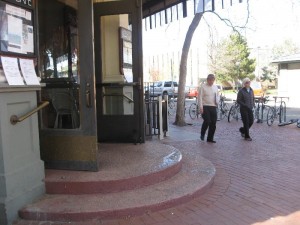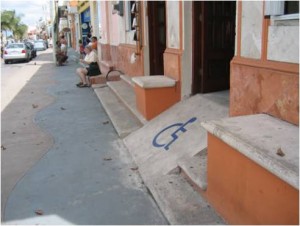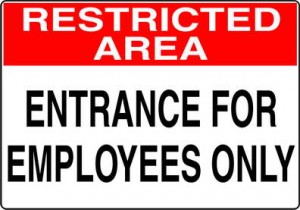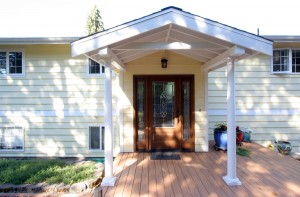Accessible Entrances
Posted on - Tuesday, June 24th, 2014The 2010 ADA Standards requires that entrances be made accessible. Not every entrance has to be, but there are requirements for the different types of entrances provided. The following entrances are required to comply:
- Public Entrances
- Parking Structure entrances
- Entrances from Tunnels or Elevated Walkways
- Entrances at Transportation Facilities
- Tenant Spaces
- Residential Dwelling Units (Not Fair Housing or ANSI)
- Restricted Entrances
- Service Entrances
- Entrances for inmates or detainees
The newsletter will explain how the accessibility requirements.
Public Entrances
ADA Section 206.4.1 requires that 60 percent of all public entrances shall comply with the door requirements listed in section 404. A public entrance is defined as:
“An entrance that is not a service entrance or a restricted entrance”
This means that if the entrance is available for the general public to use, then it will be a public entrance.


This is a tenant space with a tenant entrance

Parking Structure Entrance
Each direct access to the building from the parking structure

Entrances from Tunnels or Elevated Walkways
At least one direct entrance to the building must be accessible.

Transportation facilities
At least one public entrance serving each fixed route or group of fixed routes
Section 404 explains the requirements for the doors located at the entrances. There should be proper widths, proper hardware and maneuvering clearances. If the doors are not on grade and a ramp is required to access them, a landing at the top and bottom of the ramp should be provided and should coincide with the maneuvering clearances a the doors. The image below shows an entrance, but not accessible (even though it shows the universal symbol of access) 😉

Restricted and Service Entrances
A restricted entrance is defined as:
“Restricted entrance is an entrance that is made available for common use on a controlled basis but not public use and that is not a service entrance.”

At least one of restricted entrance to the building or facility shall comply with Section 404.

At least one primary entrance a residential dwelling unit that has to comply with ADA shall comply. Residential dwelling units that is required to comply with ADA are group homes, homeless shelters, faculty and director’s residences in places of education and sleeping quarters for emergency personnel.

Where entrances used only by inmates or detainees and security personnel are provided at judicial facilities, detention facilities, or correctional facility, at least one such entrance shall comply.
A service entrance is defined as:
“Service Entrance is an entrance intended primarily for delivery of goods or services.”

If a service entrance is the only entrance to a building or to a tenancy in a facility, that entrance shall comply with Section 404. Otherwise it is not required to.
Public Comments wanted by TDLR
The Texas Department of Licensing and Regulation (Department) is reviewing the Elimination of Architectural Barriers rules (Title 16, Texas Administrative Code, Chapter 68) for re-adoption, revision, or repeal.
The Department will determine whether the reasons for adopting or readopting these rules continue to exist by answering the following questions for each rule:
* Is it obsolete?
* Does it reflect current legal and policy considerations?
* Is it in alignment with the current procedures of the Department?
The Department encourages anyone interested in the Elimination of Architectural Barriers program to review the Notice of Intent and current Chapter 68 rules online at
http://www.tdlr.texas.gov/ab/abrules.htm
Comments may be submitted by email to erule.comments@tdlr.texas.gov
Deadline for comments-June 30, 2014
More information
Our offices will be closed on June 4th and 5th.
We are celebrating our 10th year of service to the building industry as a Registered Accessibility Specialist! Mention this newsletter and receive 10% off your next review or inspection.
If you want to learn more about these standards, be sure to check out my books:
“Applying the ADA” published by Wiley.
They are available for sale now. (also available as an e-book)
If you have any questions about these or any other topics, please feel free to contact me anytime.
Marcela Abadi Rhoads, RAS #240
Abadi Accessibility
214. 403.8714
marhoads@abadiaccess.com
www.abadiaccess.com
 Abadi
Abadi 


